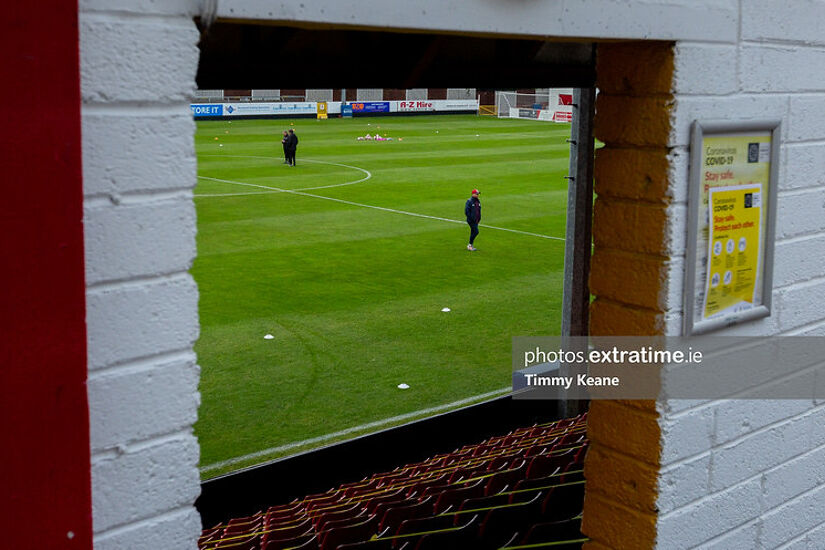Patrick Cregg: 'Academy football serves its purpose up to a certain age, but you are not learning much on the sidelines'

Richmond Park Credit: Timmy Keane (ETPhotos)
As a confident young player learning his trade at Manchester United, then Arsenal, Patrick Cregg made a career out of football, not regaining a love for the game until being a part-timer on the books of Montrose in the Scottish lower leagues. It's the reappearance of this passion and obsession that he currently employs as St Patrick's Athletic assistant manager.
“Going over to Man United, I didn't have any fear and at that age didn't ever get rejection. I was used to people telling me I was quite good, so everything was positive. When I went to Arsenal, then I realised it was a job, you were competing and started getting setbacks. It dawns on you that it's quite competitive out there, with a lot of good players around, so there's a massive difference. It also comes down to the mental side of things.”
Upon leaving Arsenal in 2006, the young Irish midfielder joined Falkirk and went on to narrowly lose the 2009 Scottish Football Cup final, in stifling conditions, to Glasgow Rangers and a Nacho Novo wonder goal just after half-time, despite dominating proceedings.
“We were gutted because we were definitely the better team, but it's just the small margins, as it is in any sport. Kris Boyd coming off at half-time and saying that he was wrecked from the heat, on a really warm day. He's replaced by Novo and you can't account for what happened next. On another day, probably 98/99 times out of 100, you win the game.
"My thought process afterwards was sad, but still happy that I played in the final. As a kid, I grew up wanting to play for Celtic against Rangers in a Scottish Cup final, but there was still a lot of desolation back in the dressing room.”
That was to be Patrick's last appearance for Falkirk, followed by brief spells at Hibernian, Greenock Morton, St Mirren and Bury. A Scottish Cup winner's medal did arrive in 2014, albeit as an unused substitute during St Johnstone's 2-0 win over Dundee United.
“I didn't play, but when you reflect, it's about the group, the team. Even those who were injured might have contributed greatly throughout the season. They were in the dressing room and might have said something that triggered someone's mindset to be able to go on and perform. You play a role, but at the time, it's a form of rejection and a negative. It might take something away from it, but again, on reflection, it's your friends and of course you want them to do well.”
Appearing on the domestic scene, for Shamrock Rovers and then St Patrick's Athletic, Cregg returned to Scottish football's lower leagues, in a part-time capacity.
“Going back over there, I was probably a bit broken. I had a lot of years at the top level and then came over to the League of Ireland and probably felt I should have done better than I actually did, from an individual standpoint. My mindset was down and a manager came into Forfar, who didn't sign me, didn't rate me and probably thought I was on the decline.
"Then I went to Montrose and got on unbelievably well, loved it and started to enjoy football again. Great management, players and I learned so much there, even though it was part-time. The camaraderie and other stuff the coaches had implemented was especially beneficial to me, in regards to my coaching career.
"I got the same mindset back that I had from being a teenager to my early twenties. I would have never said it, but early on, in my mind, I thought I was better than the next player. It was only later on that I started to doubt myself and that would get the better of me. I regained that same attitude as a hungry kid.”
Throughout his playing career, unusually, Patrick has never been on loan, not even in his younger days, to gain some valuable first-team experience.
“You need to be playing at a young age. There are some exceptions to the rule, but the top players are playing at that age, whether that's going out on loan or breaking into their own first team. Looking back now, I would have preferred to go out on loan.
"Academy football serves its purpose up to a certain age, but you're not learning much on the sidelines. While development is important, when you get into a first team, it's the result that matters. To all those people who watch football with emotional involvement, the main statistic is the scoreline. It's not the performance or the moments, which if they'd gone your way, could have changed the game … It's massive for young players to realise that.”
The Dubliner currently brings all that experience and subsequent coaching qualifications to his role as St Patrick's Athletic assistant manager, under former Arsenal and Falkirk teammate Stephen O'Donnell.
“I'm extremely fortunate and blessed. Football is my passion and I'm doing something that I love. I'm very grateful to Stephen for giving me the opportunity and trusting me. This season's going well, but we're just over halfway, so there's a long way to go and a lot of variables between now and the end of the season. The staff are very happy, but obviously, I can't speak for the manager.”
From Buncrana to Bohs - The Rise of Georgie Kelly https://t.co/UxK5wam2i3pic.twitter.com/o1IHxIeARA
— Extratime.com (@ExtratimeNews) July 22, 2021

